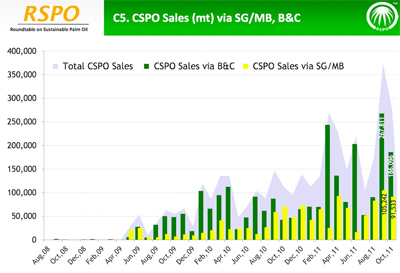As part of our coverage of the 9th Annual Roundtable Meeting on Sustainable Palm Oil currently underway in Kota Kinabalu in Sabah, Malaysia, mongabay.com is interviewing participants and attendees.
In the following interview, mongabay.com speaks with the delegation from the Rainforest Action Network (RAN), an advocacy group which has been critical of some Roundtable on Sustainable Palm Oil (RSPO) members for what is sees as ongoing social and environmental problems. RAN is not an RSPO member.
The RSPO is a membership body that sets social and environmental criteria for palm oil production. RSPO includes palm oil producers, marketers, and traders; social and environmental NGOs; and government bodies.
Q&A with RAN on the RSPO meeting
mongabay.com: Is RAN an RSPO member?
RAN: RAN is not a member of the RSPO, but we are an active stakeholder in pushing for the adoption of critical environmental and social safeguards that we believe could make the RSPO a viable tool for consumer-facing companies interested in responsible palm oil. We have attended a number of RSPO Roundtables because they offer an important opportunity to dialogue directly with companies and NGOs.
mongabay.com: What do you hope to get out of RTRS9?
RAN: Rainforest Action Network prioritizes the following goals which overlap with our work at the RT9:
At the RSPO meeting, RAN is working to:
mongabay.com: You’re in the midst of a campaign targeting Cargill, which recently committed to sourcing CSPO. Is this commitment enough to satisfy RAN’s concerns about Cargill’s palm oil sourcing?
 Oil palm and forest in Malaysian Borneo. |
RAN: Cargill can, should and must be doing much more to eliminate problematic palm oil from its supply chains. It’s true that Cargill has committed to sourcing CSPO, but it has set a distant 2020 target date for 100% CSPO globally and exempted palm kernel oil from its targets. Cargill’s modest commitments are more reactive to the urgent demands of large food business customers for CSPO than representative of an aggressive pro-active strategy by Cargill to transform their palm oil business to meet sustainability criteria. At the same time, Cargill is showing an alarming failure to deliver on its time-bound commitments including to secure RSPO certification for all of its palm oil plantations by the end of 2010, and completion of a survey and review of the practices of its palm oil suppliers by early 2011. There is no question that supply chains are complex, but we do not see Cargill bringing the urgency or resources to bear to move quickly and effectively to implement a credible and robust system of safeguards for their palm oil business.
mongabay.com: Do you have other concerns about RSPO?
RAN: RSPO still has a long way to go to align its standards with the zero deforestation palm oil consumer demand and to better address the land conflict issues that plague the industry. Nestle, the world’s largest food company, emphasized its zero deforestation commitment (and challenge to the RSPO) in plenary session. Significantly, this goal is shared by the Consumer Goods Forum.
 Sales of RSPO-certified palm oil hit a new record this year, reaching 2.04 million metric tons through October 31. Last year’s sales amounted to 1.28 million tons. |
Huge questions also remain about the credibility and consistency of RSPO certification audits and how the RSPO handles non-compliance grievances. Many observers believe that the RSPO audits are not adequately field checked to ensure there is no child labor or forced labor in the plantations, issues that are endemic in the Malaysian and Indonesian plantation sector.
To date, the RSPO still does not have a credible standard for addressing and eliminating the huge greenhouse gas emissions associated with deforestation and expansion of oil palm on carbon rich peatland areas. This is not a trivial issue. While the technical working group on greenhouse gas emissions summarized that their findings would suggest planting on peat be avoided, the RSPO still does not prohibit palm oil on peat.
mongabay.com: If RSPO addressed these issues would RAN considering joining as a member?
RAN: The RSPO’s progress in addressing our key concerns will determine our interest in membership. For RAN to consider membership we would look to the RSPO to better implement existing principles and criteria, enforce the code of conduct, resolve grievances in a mutually beneficial way, and raise its standards on labor and greenhouse gas emissions. In addition, we find that the lack of transparency and current governance structure restricts opportunities for meaningful, informed membership participation when compared to other certification bodies of which RAN is a member.
More RSPO coverage.
Related articles







